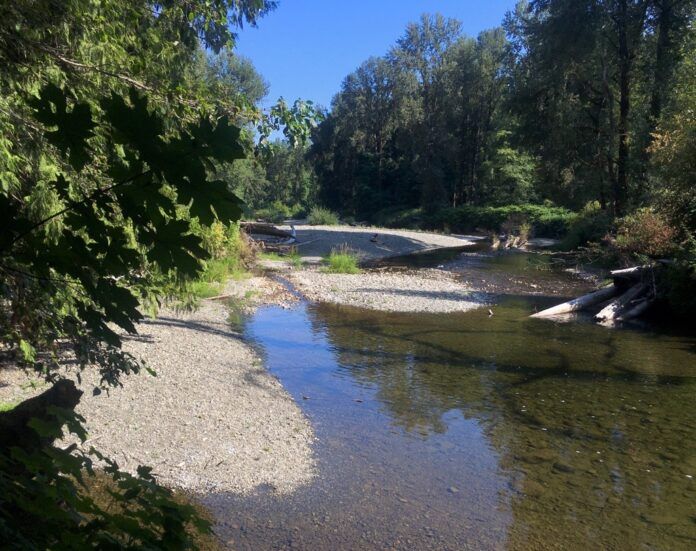Vancouver Island has so far been spared the extreme heat and widespread wildfires experienced in other areas, but the lack of significant rainfall since May is taking a toll on rivers on the southern part of the island.
Cowichan Watershed Board Strategic Priorities Director, Tom Rutherford says the Koksilah and Chemainus Rivers are running below average for this time of year.
“Right now, the flow in the Koksilah is extremely low,” Rutherford says, “and the weather forecast doesn’t look great, so I would say we’re at the point now where everyone is very worried about the impacts, not only on ecology, but also on water users.”
He says the situation in the Chemainus and Koksilah rivers is worse than the Cowichan, where a flow of 4.5 cubic metres per second is being maintained over the weir at Cowichan Lake.
While the lake and the weir provide storage for flow management, the story is different in the Koksilah River, which is traditionally sustained by snow melting in the mountains and summer rains.
Rutherford says a new, first of its kind water sustainability plan for the Koksilah is currently being developed as part of an agreement signed in the spring between Cowichan Tribes and the province.
He says it will be a new “tool under the Water Sustainability Act that would allow us to look at how we use the land in the watershed, and how we use the water” to provide more sustainable flows for the river and other interests in the watershed.
It’s a different approach to the problem that will see changes in watershed management provide a more sustainable future.
In the Cowichan River, Rutherford says the flow across the weir was lowered in the last week of June to maintain it until the autumn rains come.
“We reduced the river to an extremely low flow of 4.5 cubic metres per second to try and eke out the storage we have ‘till fall rains come.”
Rain earlier this week did boost the level of the Cowichan and Koksilah Rivers, but both have quickly returned to their previous levels.
However, Rutherford says the lake level increased by about 3-centimetres, and he estimates that likely means another four or five days of storage in late August or early September if there’s no significant rainfall between now and then.
He says this summer appears to be like 2019 when pumps were used to maintain minimal flows in the Cowichan River.
As climate change increasingly disrupts the historic cycles of rain and snow melt, Rutherford says the proposed new weir, designed to be 70-centimetres higher, will better sustain the Cowichan River during dry summers.
He says this year there was enough water in the spring that “we would have been able to store that water rather than having it flow over the weir” if the additional storage had been available.
“So, the fact that we can actually store some of that water in the Cowichan is a huge advantage when we’re trying to maintain livable conditions for the creatures that live in that watershed.”
As for the Koksilah River, Rutherford says maintaining sustainable water levels during dry summers will be done through new water use management strategies.
He says it’s clear our watersheds face difficult years ahead because of climate change, but in Cowichan ways are being found to work collaboratively on solutions to such a daunting problem.
“Whether it’s a water sustainability process, or a new weir,” says Rutherford, “First Nations and senior governments and local governments, and industry and citizens organizations have been, and are still working together to try and make progress on these issues.”
According to Rutherford, it leaves him optimistic that we’ll get to a better place, and speaks highly of the kind of community we live in.






